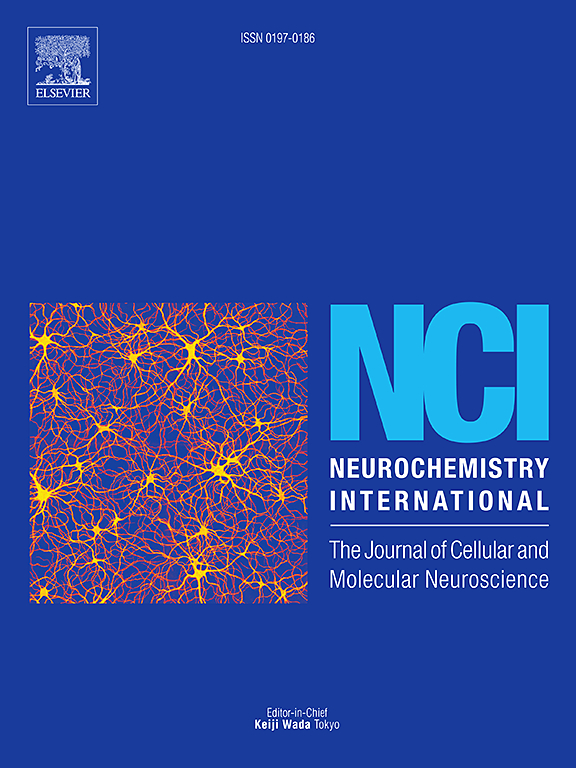Repeated administration of esketamine ameliorates mechanical allodynia in mice with chemotherapy-induced peripheral neuropathy: A role of gut microbiota and metabolites
IF 4
3区 医学
Q2 BIOCHEMISTRY & MOLECULAR BIOLOGY
引用次数: 0
Abstract
Chemotherapy-induced peripheral neuropathy (CIPN) severely diminishes the quality of life for cancer survivors, yet effective treatments remain scarce. Esketamine, a commonly used anesthetic, has demonstrated neuroprotective effects by restoring gut microbiome dysbiosis. In this study, we investigated the impact of esketamine on nociceptive sensitivity in a mouse model of CIPN and explored the potential involvement of the gut microbiome. In mice treated with oxaliplatin, repeated esketamine doses (in contrast to a single dose) significantly improved the paw withdrawal threshold (PWT). Western blot and qPCR analyses further revealed that repeated esketamine administration markedly reduced microglial activation and neuroinflammation in the dorsal root ganglion (DRG), underscoring its potent anti-inflammatory properties. Moreover, fecal 16S rRNA analysis indicated that esketamine partially restored the abnormal gut microbiota composition (β-diversity). Plasma metabolome analysis showed that repeated esketamine treatment significantly lowered the elevated levels of 6H-indolo[2,3-b]quinoline and restored the reduced levels of (3-exo)-3-[3-methyl-5-(1-methylethyl)-4H-1,2,4-triazol-4-yl]-8-azabicyclo[3.2.1]octane observed in oxaliplatin-treated mice. In addition, fecal microbiota transplantation from esketamine-treated CIPN mice notably improved both the diminished PWT and DRG neuroinflammation in oxaliplatin-treated mice. Collectively, these findings suggest that repeated esketamine administration may alleviate mechanical allodynia in CIPN mice by modulating neuroinflammation, gut microbiota, and associated metabolites.
反复给药艾氯胺酮改善化疗诱导的周围神经病变小鼠的机械异常性痛:肠道微生物群和代谢物的作用。
化疗引起的周围神经病变(CIPN)严重降低了癌症幸存者的生活质量,但有效的治疗方法仍然很少。艾氯胺酮,一种常用的麻醉剂,已证明神经保护作用,恢复肠道微生物群失调。在这项研究中,我们在小鼠CIPN模型中研究了艾氯胺酮对伤害性敏感性的影响,并探讨了肠道微生物群的潜在参与。在用奥沙利铂治疗的小鼠中,重复剂量的艾氯胺酮(与单剂量相比)显著提高了爪子戒断阈值(PWT)。Western blot和qPCR分析进一步显示,反复给予艾氯胺酮可显著降低背根神经节(DRG)的小胶质细胞激活和神经炎症,强调其有效的抗炎特性。此外,粪便16S rRNA分析表明,艾氯胺酮部分恢复了异常的肠道微生物群组成(β-多样性)。血浆代谢组学分析显示,反复使用艾氯胺酮可显著降低奥沙利铂治疗小鼠中升高的6h -吲哚[2,3-b]喹啉水平,恢复奥沙利铂治疗小鼠中(3-exo)-3-[3-甲基-5-(1-甲基乙基)- 4h -1,2,4-三唑-4-基]-8-阿扎比环[3.2.1]辛烷水平。此外,艾氯胺酮处理的CIPN小鼠的粪便微生物群移植显著改善了奥沙利铂治疗小鼠的PWT和DRG神经炎症。总的来说,这些发现表明,反复给药艾氯胺酮可能通过调节神经炎症、肠道微生物群和相关代谢物来减轻CIPN小鼠的机械性异位性痛。
本文章由计算机程序翻译,如有差异,请以英文原文为准。
求助全文
约1分钟内获得全文
求助全文
来源期刊

Neurochemistry international
医学-神经科学
CiteScore
8.40
自引率
2.40%
发文量
128
审稿时长
37 days
期刊介绍:
Neurochemistry International is devoted to the rapid publication of outstanding original articles and timely reviews in neurochemistry. Manuscripts on a broad range of topics will be considered, including molecular and cellular neurochemistry, neuropharmacology and genetic aspects of CNS function, neuroimmunology, metabolism as well as the neurochemistry of neurological and psychiatric disorders of the CNS.
 求助内容:
求助内容: 应助结果提醒方式:
应助结果提醒方式:


